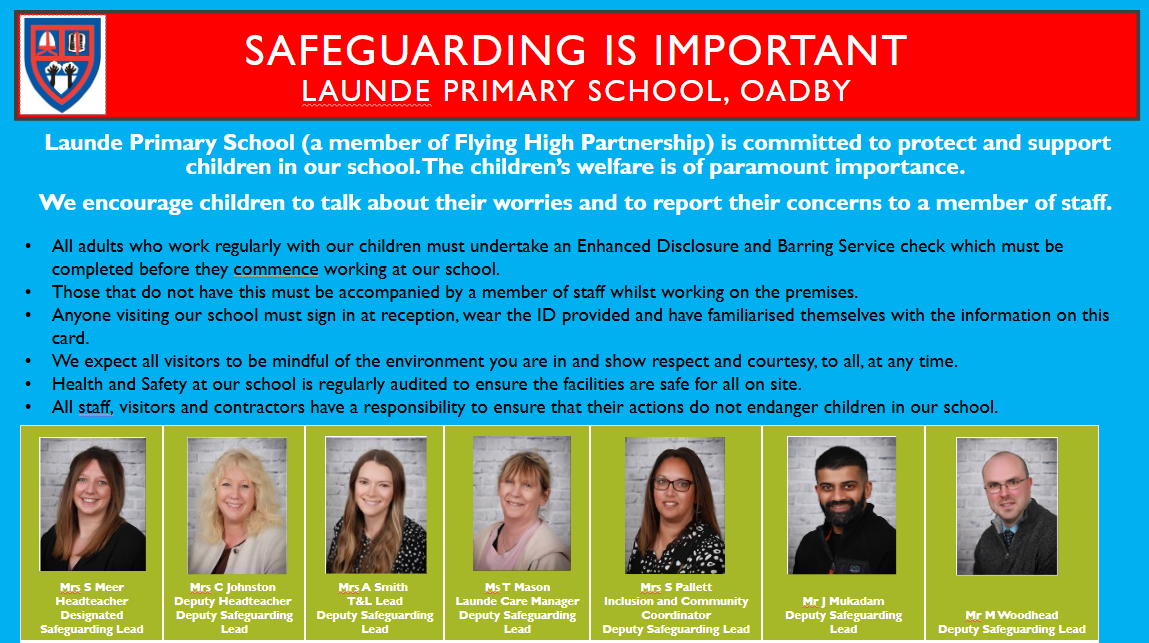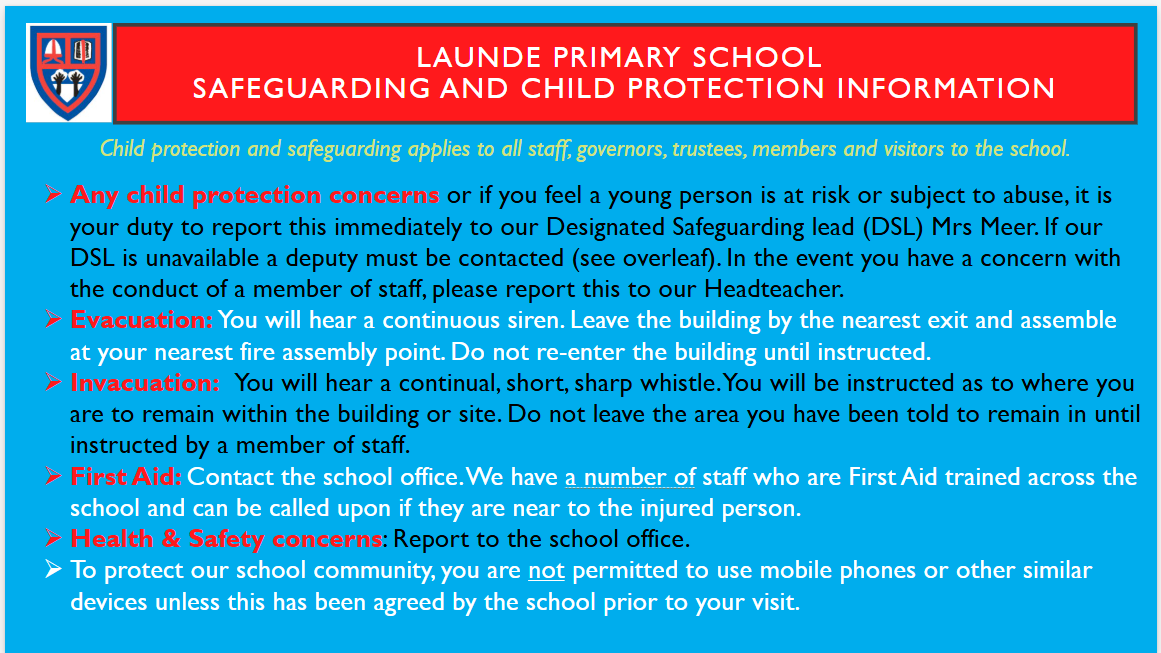Safeguarding & Child Protection Policy and Procedures
"Safeguarding is everybody's responsibility"
Children have a right to be cared for and protected and protecting them is everyone’s responsibility. Here at Launde Primary School we have a duty of care to ensure that all users of the school are kept safe from harm. We are committed to providing a secure and supportive environment in which children can develop and grow into mature and responsible people. Safeguarding children is an essential part of our holistic approach to ensure that children are protected from abuse and neglect and that every child reaches their full potential.


We are committed to safeguarding and meeting the needs of all our pupils.
Annually, all of our school staff have safeguarding and child protection training. This is delivered by either the Headteacher, a member of the DSL team or an external provider, who have up-to-date regional/national training. All members of staff have a duty of care no matter their position and it is essential that they all understand effective safeguarding processes, procedures and reporting.
This training is continued throughout the year for teachers and TA's that focuses on more specific elements of Child Protection. The Governing Body also carry out a termly monitoring visit and a DSL team complete 'walkabouts' within school to ensure the school is meeting its safeguarding responsibility.
The school's DSLs meet regularly to discuss pupils and their families and review the needs, support or next steps required for our pupils.
All staff are vigilant and the school promotes a culture of safeguarding.
What are your responsibilities as a visitor to our school?
All those who come into contact with our pupils have a duty to safeguard and promote the welfare of the children. Supply teachers/students will be briefed on arrival at the site (before they begin work) and will be issued with a green coloured lanyard. They will be aware of possible signs and indicators of abuse and will bring their concerns immediately to a DSL.
School-year aged students and other volunteers will not have received child protection training and MUST NEVER be left alone with a child/children at any point; a Child Protection trained member of staff should always be in sight and hearing of a student/volunteer and these adults will be issued with a red lanyard.
All pupils have been taught about the coloured lanyards and what to do if they are concerned about any adults in our school.
What you should do if you are worried about a child?
If you suspect or believe a child is suffering, or is likely to suffer, significant harm (including any form of mistreatment or abuse) you should ALWAYS report your concerns. Safeguarding is everyone’s responsibility
In an emergency, always dial 999
Contact Leicestershire police on 101 if you think a crime has been committed but there is no immediate danger.
Contact our First Response Children’s Duty Team if you think a child is being:
- neglected
- physically abused
- sexually abused
Telephone the First Response Children’s Duty Team if you have urgent concerns about a child who needs a social worker or police officer today:
Call 0116 305 0005 (24 hour phone line)
Leicestershire County Council have a designated page on their website with more information and advice on what to do if you are concerned about a child https://resources.leicestershire.gov.uk/education-and-children/child-protection-and-safeguarding
What can parents do to keep children safe and happy?
Parents are the most important people to keep their children safe. Parents should always:
- Feel confident to raise concerns about your child.
- Talk to the school if you need help or support.
- Read the school policies about keeping children safe.
- Let the school know if your child has a medical condition.
- Let the school know if you have any issues, including court orders, relating to the safety of your child.
- Let the school know if there is a change in your circumstances i.e. change of address, contact number, change of name, separation or divorce, loss of income etc.
- Tell the school who will be dropping off or collecting your child and provide the school with at least two other emergency contacts.
- Let the school know if your child is going to be absent from school and the reasons.
Safeguarding Curriculum
Keeping children safe is a key priority in school. Safeguarding takes many forms including: protecting children from harm; preventing impairment of children’s health and development; enabling safe and effective parenting and giving children equal opportunities in life.
We do many things every day in school to ensure pupils are safe, including: ensuring all staff are trained in safeguarding; having clear policies and procedures in place to keep children safe; monitoring pupil attendance; ensuring a safe and healthy site; ensuring the behaviour of pupils is in line with our school's behaviour policy/curriculum and using our curriculum to teach children about risk taking, diversity, healthy lifestyles, managing relationships, online safety and much more.
A culture of safeguarding is embedded at Launde Primary School. We pride ourselves in knowing our children and the needs of both the individuals within our community and the needs of the wider community itself. As a result of our knowledge and experience of the challenges some of our students face, we recognise that they are at greater risk of:
- Online Safety – This is addressed by our online safety curriculum delivered through the PSHE and Computing Curriculum.
- Mental health and Well-being - This is addressed through our PSHE curriculum and our comprehensive Mental Health Strategy within school, which offers a graduated approach to support all pupils with their mental health. We have recognised as a school that resilience and a fear of failure is something children frequently talk about, so this has been incorporated into our PSHE and behaviour curriculum for all year groups and children are consistently encouraged to be resilient, why this is important and how to cope with not getting everything correct all the time. These are important lessons for our children and are reiterated across all subjects and through whole school assembly themes. In addition to this, we have our own Mental Health First Aiders trained on site to support pupils and their families when needed.
- Domestic Abuse – The school receives Operation Encompass emails when there has been an incident outside of school which involves any agency, whether pupils were present or not. Operation Encompass is a process that informs schools of reported domestic abuse incidents, where a child has been in the same household or is affected by the incident, during the next school day. The schools Designated Safeguarding Leads are contacted after the referral to discuss the incident. Encompass is managed and run in the MASH (Multi-Agency Safeguarding Hub) which is able to link Police, Social Care and Health information about children.
- Risk of FGM – We educate children on their rights, through PSHE/RSE and Oracy and this is our way of starting the conversation and laying the foundations of FGM. As we know that girls are most at risk between the ages of 5 – 12 years old, and as a primary school, we play an important part in safeguarding girls from FGM. FGM is a safeguarding issue and is treated like any child protection concern. It is a mandatory part of safeguarding training and is undertaken yearly by all staff.
- Vaping - Vaping is something that is becoming an increasingly worrying problem amongst young children. Although as a school we do not consider this a problem area, we remain dedicated to teaching our children about the risks and dangers associated with vaping through our comprehensive PSHE curriculum. We also acknowledge that parents may require support around this area and therefore share any information that we feel would help in any way. Action for Children have published a useful website with a helpful guide for parents and carers (please click on the link) https://parents.actionforchildren.org.uk/behaviour/challenging-behaviour/im-worried-about-my-child-vaping/
Please see below our Child Protection and Safeguarding Policy, Scholars Safeguarding Strategy PowerPoint, Operation Encompass letter, Keeping Children Safe in Education document, which informs all of our safeguarding practice at school and our long term PSHE/RSE plan.
- https://www.nspcc.org.uk/about-us/contact-us/
- Main contact: 0808 800 5000 (help@nspcc.org.uk)
- ChildLine: 0800 1111
- FGM direct line: 0800 028 3550
- Gangs direct line: 0808 800 5000
- Whistleblowing advice line: 0800 028 0285

